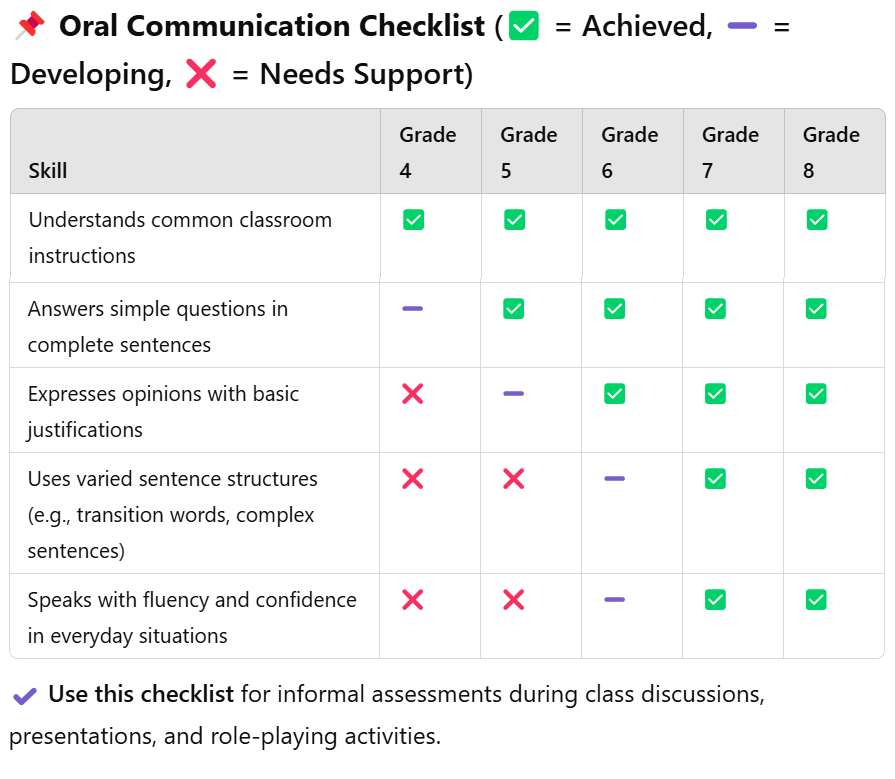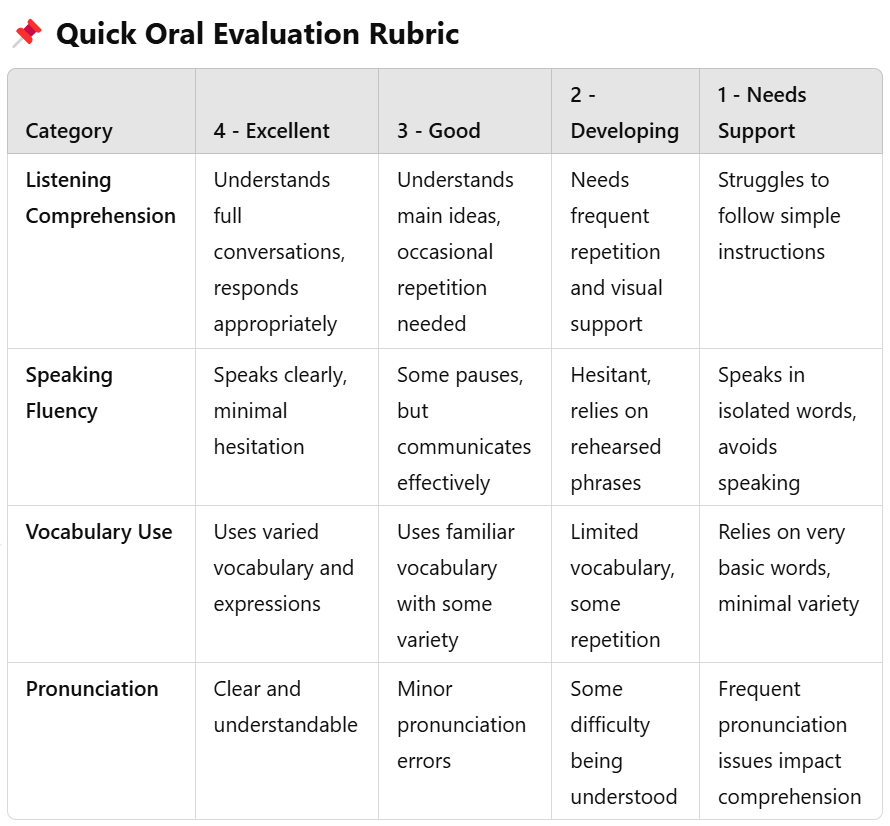|
French
Listening & Speaking Continuum (Ontario Curriculum)
For
French Core (Grades 4-8) & French Immersion (Grades 1-8)
This
is a structured continuum of learning for both French
Immersion
and Core French programs, focusing on listening and speaking
to
build confidence and retention.
This
framework ensures that both short-term and long-term teachers (even
those without French proficiency) can effectively support students'
progress.
Focus:
Confidence-building, retention, and consistency across grades.
Designed
for: Any teacher, including those with limited French
proficiency.
Goal:
Ensure students progressively develop listening and speaking skills
through structured, meaningful interactions.
CORE
FRENCH (Grades 4-8)
Time
Expectation: 20-30 minutes per class focused on oral
skills.
Approach:
Guided oral practice → Repetition & Modeling
→ Gradual
independence
Grade
4 (Introduction to basic interactions)
Listening:
Understand
and respond to simple classroom instructions.
Recognize
common expressions (greetings, feelings, weather).
Follow
along with short, repetitive stories or songs with visual cues.
Speaking:
Use
rehearsed phrases and simple sentences (e.g.,
“J’aime les
pommes”).
Answer
familiar questions with 1-2 word responses.
Participate
in short, guided dialogues (e.g., asking someone’s name).
Project:
"All About Me" poster with oral presentation of 3-5 simple
sentences.
Teacher
Tip: Use gestures, realia, and word walls to support comprehension.
Grade
5 (Building simple conversations)
Listening:
Follow
basic descriptions of people, places, and activities.
Recognize
key words and main ideas in familiar topics.
Listen
for cognates (similar words in French and English) to aid
comprehension.
Speaking:
Answer
basic questions using complete sentences (e.g., "Où
habites-tu?" → "J’habite à Toronto.").
Express
likes, dislikes, and preferences.
Role-play
everyday scenarios (ordering at a café, introducing a
friend).
Project:
Partner interview on favourite activities, recorded & shared.
Teacher
Tip: Use sentence starters (e.g., "J'aime...", "Je
préfère…").
Grade
6 (Describing and expressing opinions)
Listening:
Follow
short conversations with context clues.
Identify
key details in spoken descriptions.
Listen
to a familiar story and answer comprehension questions.
Speaking:
Use
common verbs (aimer, aller, être, avoir) in simple
conversations.
Describe
daily activities and interests in 3-4 connected sentences.
Retell
a short event using past or future tense with support.
Project:
Restaurant role-play (order food, ask for recommendations).
Teacher
Tip: Have students listen to short dialogues & repeat key
phrases.
Grade
7 (Sustained interactions & storytelling)
Listening:
Understand
longer, structured dialogues and descriptions.
Infer
meaning using tone and key words.
Follow
along with a short radio clip or podcast excerpt.
Speaking:
Use
transition words to extend responses (mais, parce que, donc).
Express
simple opinions with justifications.
Engage
in guided debates (e.g., best school subject).
Project:
Create and present a short news report on a school event.
Teacher
Tip: Use call-and-response or group sentence-building activities.
Grade
8 (Spontaneous conversations & persuasion)
Listening:
Understand
longer spoken texts with some unfamiliar words.
Identify
tone and intention in a speaker’s message.
Follow
along with a short French video and summarize key points.
Speaking:
Engage
in impromptu conversations on familiar topics.
Use
varied sentence structures (comparisons, cause-effect).
Debate
and defend opinions using logical arguments.
Project:
Debate Day! (e.g., "Should homework be banned?").
Teacher
Tip: Use role-playing games for spontaneous practice.
FRENCH
IMMERSION (Grades 1-8)
Time
Expectation: 50-70% of instruction in French (depending on
grade
level).
Approach:
Immersive exposure** → **Authentic conversations** →
**Expanding
ideas
Primary
(Grades 1-3) (Building oral fluency through play)
Listening
Follow
common routines and teacher instructions.
Recognize
**high-frequency words** in songs and stories.
Respond
to **yes/no and either/or questions**.
Speaking:
Use
short, memorized phrases in full sentences.
Describe
people, objects, and actions with visuals.
Participate
in storytelling and role-playing.
Project:
Create a class story and present **one sentence each**.
Teacher
Tip: Use **puppets, gestures, and Total Physical Response (TPR)**.
Junior
(Grades 4-6) (Expressing ideas and emotions)*
Listening:
Understand
simple explanations and short presentations.
Follow
a story without visual cues.
Recognize
expressions for feelings and emotions.
Speaking:
Express
personal experiences in 4-5 connected sentences.
Ask
and answer open-ended questions.
Use
past and future tense with support.
Project:
Host a “French talk show” on a chosen topic.
Teacher
Tip: Use sentence frames to support longer responses.
Intermediate
(Grades 7-8) (Debating and storytelling)
Listening:
Comprehend
main ideas in authentic French audio/video.
Infer
meaning in unfamiliar words using context.
Follow
a natural-speed French conversation with support.
Speaking:
Participate
in structured debates.
Retell
stories with details and opinions.
Express
complex ideas using varied sentence structures.
Project:
Create a French podcast episode on a current issue.
Teacher
Tip: Use real-world prompts (e.g., "How would you describe your
ideal weekend?").
SUPPORTING
TEACHERS (Even With No French!)
1.
Daily Oral Routines: Use consistent expressions (e.g.,
“Répétez
après moi,” “Comment ça
va?”).
2.
Scaffolding: Provide sentence stems, visuals, and graphic organizers*
3.
Listening Before Speaking: Start with **videos, songs, and
read-alouds.
4.
Student-Led Learning: Let students model and correct each other.
5.
Gamification: Incorporate charades, dialogues, and interactive
activities.
6.
Cultural Connections: Explore Francophone traditions, music, and
real-world content.
Here
are assessment
tools and teacher-friendly planning templates
to support implementation.
These resources
help track student
progress and guide lesson planning for short-term
or long-term
teachers, even those with limited French proficiency.
Assessment
Tools & Planning Templates for French Listening &
Speaking
Designed
for Core French & French Immersion (Grades 1-8)
Easy-to-use,
adaptable for any teacher
Focus
on oral confidence, retention, and student engagement


Use
this for** **presentations, conversations, or daily check-ins**.
Student
Self-Assessment ("Mon Français Aujourd’hui")
Weekly
Reflection (Students rate themselves out of 5 & write a
sentence)
Listening:
Did I understand my teacher and classmates today? (1-5)
Speaking:
Did I try to speak in full sentences today? (1-5)
New
Words: One new French word I learned today: ____________
Confidence:
One sentence I said in French today: _____________
Use
this to build self-awareness and goal-setting..

Use
this as a simple framework** for teachers to plan daily oral
practice.
Emergency
Lesson Plan for Non-French Teachers (No Prep Needed!)
Scenario:
A non-French teacher is covering the class. They need something easy
to run!
Activity:
"Find Someone Who…" (Speaking & Listening Game)
Materials:
Pre-made question sheets (e.g., "Find someone who likes
chocolate").
How
it Works:
1.
Students walk around the class and ask each
other yes/no
questions in French.
2.
They write the names of classmates who match the descriptions.
3.
At the end, they share their findings in French.
This
ensures students still practice oral skills, even with a non-French
teacher!
3.
Additional Student Engagement Strategies
Drama
& Role-Playing
-
Students act out real-world scenarios (restaurant, doctor’s
office,
lost tourist).
Classroom
Podcasts
-
Assign students to record short conversations (e.g.,
“What’s your
dream vacation?”).
French
Music Mondays
-
Play a French song & have students listen for key words.
Silent
Video Descriptions
-
Show a silent clip & have students describe
what’s happening
in French.
|


